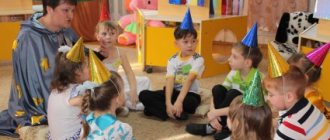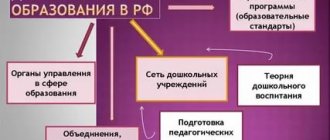Presentation of Federal State Educational Standards Pre-presentation on the topic
Slide 1
THE FEDERAL STATE EDUCATIONAL STANDARD OF PRESCHOOL EDUCATION WAS APPROVED by the Order of the Ministry of Education and Science of the Russian Federation on October 17, 2013.
Slide 2
I. GENERAL PROVISIONS 1.1. This federal state educational standard for preschool education (hereinafter referred to as the Standard) is a set of mandatory requirements for preschool education. The subject of regulation of the Standard is relations in the field of education that arise during the implementation of the basic educational program of preschool education (hereinafter referred to as the Program) by organizations engaged in educational activities (hereinafter referred to as Organizations), individual entrepreneurs or parents (legal representatives). Organizations and individual entrepreneurs have the right to implement the Program if they have the appropriate license to carry out educational activities. Children, their parents (legal representatives), teaching staff and their representatives, Organizations, federal government bodies, government bodies of constituent entities of the Russian Federation, local governments, employers and their associations participate in the implementation of the Program.
Slide 3
1.2. This Standard uses the following basic concepts: Variability and diversity of organizational forms of preschool education Variability of the content of educational programs Unity of the educational space Zone of proximal development Individualization of education Comprehensive educational program Partial educational program Continuity of basic educational programs, etc.
Slide 4
The UN Convention on the Rights of the Child, the Constitution of the Russian Federation, the legislation of the Russian Federation, which are based on the following basic principles Collection of international treaties of the USSR, 1993, issue XLVI. Collection of Legislation of the Russian Federation, 1996, No. 3, Art. 152; No. 7, art. 676; 2001, No. 24, Art. 2421; 2003, No. 30, Art. 3051; 2004, No. 13, art. 1110; 2005, No. 42, art. 4212; 2006, No. 29, art. 3119; 2007, No. 1, art. 1; No. 30, art. 3745; 2009, No. 1, art. 1, art. 2; No. 4, art. 445. 3. The standard is developed taking into account
Slide 5
basic principles of supporting the specificity and diversity of childhood; preserving the uniqueness and intrinsic value of childhood as an important stage in the overall development of a person; personal developmental and humanistic nature of interaction between adults and children; respect for the child’s personality as a mandatory requirement for all adult participants in educational activities; carrying out educational activities in forms specific to children of a given age group, primarily in the form of games, cognitive and research activities.
Slide 6
The Standard takes into account: the special educational needs of certain categories of children, including those with disabilities; opportunities for a child to master the Program at different stages of its implementation.
Slide 7
1.5. The standard is aimed at achieving the following goals: increasing the social status of preschool education; ensuring by the state equal opportunities for every child to receive high-quality preschool education; ensuring state guarantees of the level and quality of education based on the unity of mandatory requirements for the conditions for the implementation of basic educational programs, their structure and the results of their development; maintaining the unity of the educational space of the Russian Federation regarding the level of preschool education
Slide 8
1.6. The standard is aimed at solving the following tasks: protecting and strengthening the physical and mental health of children, including their emotional well-being; ensuring equal opportunities for the full development of each child during preschool childhood, regardless of place of residence, gender, nation, language, social status, psychophysiological characteristics (including disabilities); ensuring continuity of basic educational programs of preschool and primary general education; creating favorable conditions for the development of children in accordance with their age and individual characteristics and inclinations to develop the abilities and creative potential of each child as a subject of relationships with himself, other children, adults and the world;
Slide 9
1.6. The standard is aimed at solving the following tasks: combining training and education into a holistic educational process based on spiritual, moral and sociocultural values and socially accepted rules and norms of behavior in the interests of the individual, family, and society; formation of a general culture of children’s personality, development of their social, moral, aesthetic, intellectual, physical qualities, initiative, independence and responsibility of the child, formation of prerequisites for educational activities; ensuring variability and diversity of the content of educational programs and organizational forms of the level of preschool education, the possibility of creating educational programs of various directions, taking into account the educational needs and abilities of children;
Slide 10
1.6. The standard is aimed at solving the following tasks: creating a socio-cultural environment that corresponds to the age, individual, psychological and physiological characteristics of children; providing psychological and pedagogical support to the family and increasing the competence of parents (legal representatives) in matters of development and education, protection and promotion of children’s health; determining directions for systematic interaction between individuals and legal entities, as well as interaction between pedagogical and public associations.
Slide 11
1.7. The standard is the basis for: developing exemplary educational programs for preschool education (hereinafter referred to as Exemplary Programs); development of standards for financial support for the implementation of the Program; formation by the founder of a state (municipal) assignment in relation to Organizations; objective assessment of the compliance of the Organization’s educational activities with the requirements of the Standard for the conditions of implementation and structure of the Program; training, professional retraining, advanced training and certification of teaching staff, administrative and managerial staff of organizations and individual entrepreneurs, assistance to parents (legal representatives) in raising children, protecting and strengthening their physical and mental health, developing individual abilities and the necessary correction of their developmental disorders.
Slide 12
1.8. The standard establishes the requirements: for the structure of the Program and its scope; to the conditions of implementation of the Program; to the results of mastering the Program.
Slide 13
II. REQUIREMENTS FOR THE STRUCTURE OF THE BASIC EDUCATIONAL PROGRAM OF PRESCHOOL EDUCATION AND ITS SCOPE
Slide 14
2.1. The program determines the content and organization of educational activities at the level of preschool education. The program ensures the development of the personality of preschool children in various types of communication and activities, taking into account their age, individual and psychological and physiological characteristics and should be aimed at solving the tasks of the Standard specified in paragraph 1.6 of the Standard.
Slide 15
2.2. The program is formed as a program of psychological and pedagogical support for positive socialization and individualization, personality development of preschool children and defines a set of basic characteristics of preschool education (volume, content and planned results in the form of targets for preschool education).
Slide 16
2.3. The program is aimed at: creating conditions for the development of preschool children that open up opportunities for positive socialization of the child, his comprehensive personal development, development of initiative and creative abilities based on cooperation with adults and peers and activities appropriate for preschool age; to create a developing educational environment.
Slide 17
2.5. The content of the Program should ensure the development of the personality, motivation and abilities of children in various types of activities and cover the following educational areas: social and communicative development; cognitive development; speech development; artistic and aesthetic development; physical development.
Slide 18
2.7. The content of the Program should reflect the following aspects of the educational environment for a preschool child: ● subject-spatial developmental educational environment; ● the nature of interaction with adults; ● the nature of interaction with other children; ● the child’s system of relationships to the world, to other people, to himself.



